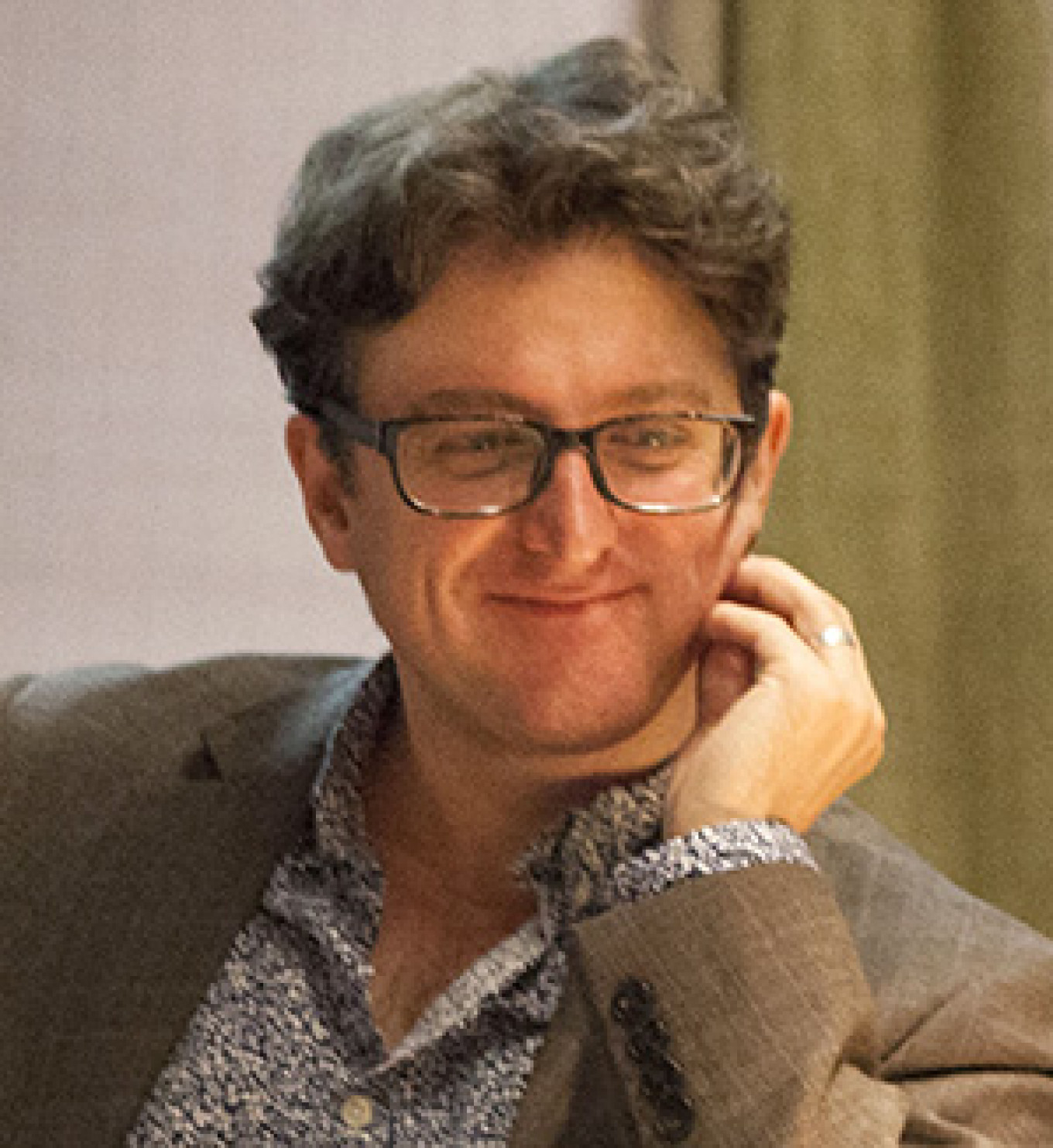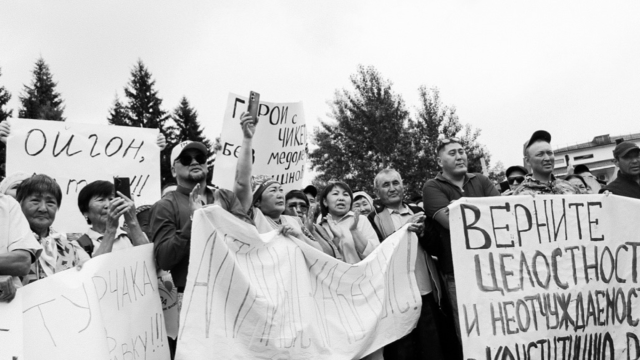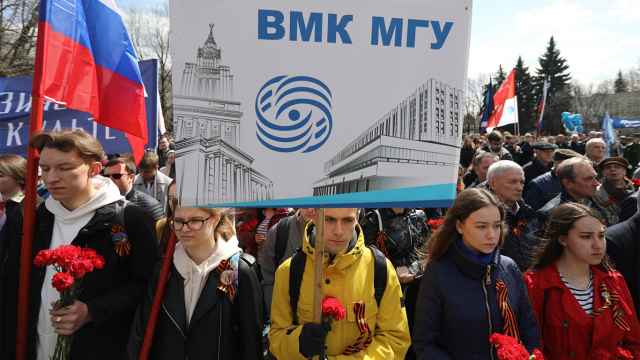For over 25 years, British ethnographer Jeremy Morris has been traveling to the Kaluga region southwest of Moscow. The largely provincial region first appeared as the backdrop to his debut book on working-class communities in Russia after the Soviet collapse. Kaluga makes a comeback in Morris’ latest book, “Everyday Politics in Russia,” a sweeping study of Russian society’s ambivalent response to the full-scale invasion of Ukraine and how ordinary people navigate civic life beyond the reach of an authoritarian system that seeks, but never fully manages, to stamp out independent social organization.
Morris is very skeptical of data-heavy analysis of the social world — especially in a country like Russia, where authorities manipulate statistics and citizens are often wary of pollsters. Morris embeds himself in the world of the subjects he writes about. He haunts factory floors and chats with laborers, lingers about small-town libraries and stores, and often helps out the elderly with odds and ends in the dacha community where he first set up base in Kaluga many years ago. This, he believes, is where Russia truly begins — not in the halls of the Kremlin, but in the ordinary places where Russians live their lives.
Morris is the rare Western scholar to have conducted fieldwork in Russia since the full-scale invasion of Ukraine. But “Everyday Politics in Russia” is about much more than the war. It explores resilience, adaptation and the ways people carve out space for themselves within a system designed to keep them in line. Like anyone else, Morris argues, Russians seek connection, social belonging and sincerity in their personal relationships. Yet for decades, the government has stripped these social needs of their value — needs that, as many Russians feel, were once more meaningfully fulfilled in the Soviet period, however imperfectly.
At its core, “Everyday Politics in Russia” is preoccupied with absence: the value of things left behind and how the ghosts of the past are traced onto the memories of Russians. Morris never seeks to excuse those who today support Vladimir Putin or the war against Ukraine, but he does place their sentiments in a broader historical and socio-economic context, directing the reader back to the absent social order from which they sprang.
The Moscow Times sat down with Morris to discuss his new book.
This conversation has been edited for length and clarity.
The Moscow Times: Why do you think it’s important to look beyond Vladimir Putin and Kremlin politics, focusing instead on what you call ‘micro-politics’?
Jeremy Morris: It started with irritation. The dominant political science about Russia is overwhelmingly macro, focusing on figures like Putin and using tools like public opinion surveys. But these tools don’t capture the complexity of everyday life, which is often far more nuanced.
My book is a response to that. I argue that Russian elite politics is more reactive to ordinary people’s hopes and fears than people think, and there’s much more to Russian society than the broad, often misleading narratives we hear. Yes, there’s a small but vocal ultra-nationalist minority, but it’s important not to overstate its significance.
I wrote this book to push back against oversimplifications of Russians and to highlight the everyday dynamics that shape Russian politics in ways that often get overlooked.

MT: You describe ordinary Russians as lay experts and as co-creators of your research. What role do they play in your latest book?
JM: This is partly a political stance. I wanted to challenge mainstream approaches in the social sciences by showing that even ‘uneducated’ Russians are capable of understanding their own situation and analyzing it. This isn’t a naive project – I don’t take anything at face value. My role as an ethnographer is to observe, not just listen, and to put what people say into context. For example, I discuss a family that should be loyal to Putin based on their improved living standards since the 90s. They were initially supportive, especially during the Crimea annexation, but their feelings are more complicated. If we only listened to them, we might think they were fully behind Putin, but my observations show their disillusionment with ‘Putinism.’ While they still have some respect for him, they aren’t an uncritical pro-Putin group.
This kind of complexity can only be revealed through engaged, immersive research. The performative loyalty people show toward their leaders can only be understood through deep contextual observation.
MT: Do you think that the foundations of Putinism are superficial and weak?
JM: Yes, I do. This idea is controversial, and it’s not the main argument of the book, but I’m challenging the consensus that people and Putin are perfectly aligned and that Russians have unconditionally supported him for years. Russia may be authoritarian, but that’s not the primary concern of most Russians when thinking about their country. They know elections are unfair, and they know about elite corruption, but do they feel politically powerless or unheard? It’s a mixed answer.
My book is a response to overly cynical, depoliticized views of Russians, like those informed by Yuri Levada and his colleagues in Russia. They often portray Russians as disengaged and pessimistic. And while I respect their work, I think their findings are colored by their own political position. I take a more humanistic stance: I believe that humans have the capacity to come together and solve social problems. The book isn’t just about Russia. It’s about whether we believe in the potential for humans to act positively or if we see their darkest instincts as dominant.
MT: How did the 2022 invasion shape your understanding of Russia and Russians? Given that you began working on the book in 2018, did your perspective, or that of the people you spoke with, change fundamentally?
JM: Well, for starters, I have more respect for them now. In 2014, several informants I spoke with predicted a big war, and I didn’t believe it at the time. This highlights how many Russia experts like me in the West failed to foresee the full-scale invasion, assuming the Russian elite wouldn’t act with such irrationality. I had to take my informants more seriously since many proved savvier than I liked to think I was. My book also had to change. It became a political anthropology — exploring people’s views on the war, the West, Ukraine and their place in the world. But the book’s core idea remained unchanged: whatever happens in Russian society is tied to a frustrated longing for a more communal and — dare I say — even socialist, politics. That was the original idea of the book in 2018.
MT: Let’s talk about that frustrated longing. You frequently use the term post-Soviet ‘haunting’ in the book. You argue that many Russians do not experience nostalgia for the Soviet period per se, but they do feel a deep absence of collective purpose, a lost sense of stability and social cohesion that once structured their lives. Do Russians themselves agree with this interpretation?
JM: This is a great example of where many of my interlocutors would probably disagree with my argument, and that’s fine. It often depends on their personal experience. For instance, many middle-class people would align themselves with the Levada version of Russian reality, which paints most Russians as cynical individualists, nationalistic, jingoist or imperialist — viewing that as Russia’s main problem. They wouldn’t recognize the version of reality I present. But that’s part of why I’m presenting it because I think Russia is an extreme example of class division. The educated, English-speaking Russians get to tell the story, but they have almost no meaningful contact with the people they purport to represent. That’s part of the problem. Educated, liberal, middle-class Russians, often afraid of their compatriots, are prone to gross generalizations about this ‘dark mass’ of uneducated, frightening desires. It’s an old stereotype about so-called ‘deep’ Russia.
That said, many people tell me, ‘Yes, this is exactly what I feel. You’ve articulated it in a way I couldn’t, but it captures the essence of what we lack.’ In the book, I use the term ‘haunting’ to describe something that resonates with a sense of an absent presence. It’s a paradox, but it sums up the idea that society could have been organized differently, drawing from the Soviet experience. That past is still present through our thinking, talking and acting today — it doesn’t go away. It’s not nostalgia. I really dislike how nostalgia is often used to stigmatize genuinely held beliefs. Some people talk about the Soviet Union’s positive aspects, not to glorify it but to question why certain things were better, like why there were no homeless people, people had a recognized right to certain basic means of existence, access to healthcare, even if it was very far from perfect. Calling those reflections ‘nostalgia’ is patronizing. Instead, I prefer ‘haunting.’
MT: In your book, you describe Russia as an early warning system for the West. Given recent developments in the U.S., especially since the re-election of Donald Trump, but also with the rise of far-right political entrepreneurs in Europe, do you feel this argument is even more relevant now?
JM: I was more right than I ever wanted to be. Just like the unexpected intensity of Trump’s second term so far, my argument about Russia serving as a time machine for a potential future authoritarian society has proven to be more relevant, and faster, than anticipated. While we already live in societies with less visible forms of domination, the speed at which Western nations — particularly the U.S. and parts of Europe — are heading toward a Russia-like scenario is alarming. Even in constitutionally strong societies, like the U.S., mechanisms designed to prevent authoritarian control can be undermined by the right political maneuvering, sometimes mirroring tactics used by Putin.
My point is that Russia is not unique in this regard. The global rise of populism and democratic backsliding, seen in countries like Hungary, Turkey and the U.S., reflects a common trend: political elites denying the legitimate grievances of large segments of the population, pushing them toward the far-right in frustration. This frustration is a key political driver, as seen with Trump’s support base, for example, where many voters were motivated by factors other than racism or ignorance. Ultimately, this points to a broader failure of the neoliberal system, which, over the past 40 years, has worsened outcomes for most people in the wealthiest countries.
For more information about Jeremy Morris and his book, see the publisher’s website here.
A Message from The Moscow Times:
Dear readers,
We are facing unprecedented challenges. Russia's Prosecutor General's Office has designated The Moscow Times as an "undesirable" organization, criminalizing our work and putting our staff at risk of prosecution. This follows our earlier unjust labeling as a "foreign agent."
These actions are direct attempts to silence independent journalism in Russia. The authorities claim our work "discredits the decisions of the Russian leadership." We see things differently: we strive to provide accurate, unbiased reporting on Russia.
We, the journalists of The Moscow Times, refuse to be silenced. But to continue our work, we need your help.
Your support, no matter how small, makes a world of difference. If you can, please support us monthly starting from just $2. It's quick to set up, and every contribution makes a significant impact.
By supporting The Moscow Times, you're defending open, independent journalism in the face of repression. Thank you for standing with us.
Remind me later.







